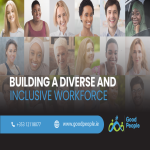We at GoodPeople are excited to welcome you to Ireland where you will begin to experience the benefits of your commitment and dedication to your career. Our international student programs are designed to ensure you access world-class training and development as a healthcare practitioner. We want your career to advance to the next level and we want you to become one of the best in your field. That is why we partner with you, your chosen training institute, and the necessary Irish authorities to ensure that from the first day of your arrival, you will feel confident that you made the right decision to come to Ireland and to work with GoodPeople.
Orientation
This document will guide you through the first few weeks of your life in a new country and city. It is just a guide and does not cover all the necessary information you will need, so be proactive in doing some exploring and research of your own. The best place to look for any information on your course or training program is on your institute’s website. As an international student, you will also be supported by the international students’ office at your college or university. Be sure to visit them as soon as possible, introduce yourself, and make sure you understand what they can do for you. Plan to attend orientation events for your institution and program. It is a good way to meet fellow students and other key people. GoodPeople’s orientation is not meant to replace that.
Important Documents
If you are a student in nursing or will be working in the healthcare field and vulnerable sector, you will need a police clearance from your country. Your institution will normally have forms to get you a Garda Vetting. Some institutions might allow you to apply before your arrival. The Irish Gardaí (police) will have to work with authorities in your country to vet you and this may take time. So, find out from your institution if you can get the ball rolling before your arrival. You may also need proof of any immunizations you take in the 12 months prior to your arrival. Make sure you have records of these on hand.
Also, bring certified copies of your transcripts for your diplomas, degrees, and any other documentation that might be required in your pursuit of employment. Some employers will ask for such documents, others may not, but be sure you can back up your education and qualifications with proof. If you are married or have children, also bring certified copies of marriage and birth certificates for all of your immediate family members. Again, it is good, should the situation arise, to be able to produce these documents immediately.
Always keep a certified copy for yourself when you send any important documents to authorities, employers, or colleges/universities. Do not send originals unless specifically asked.
Cost of Living
Research the cost of living in Ireland and make sure you can afford to take care of yourself without a job for at least four weeks. This will reduce the pressure and stressors of money and allow you to get familiar with your institution and Irish culture while you adjust to your new life. If you will be living in university or college accommodation, find out what they offer along with that. Also, there maybe meal cards or other student-friendly budget programs in place.
Accommodation
If you are not planning to live in student housing, you can use these websites to find rental accommodation:
Gumtree.ie Daft.ie Rent.ie Property.ie Let.ie
Your institution may also have some tools or reference facilities to help you find a place close to the campus. In some cases, you may complete rental agreements before you arrive in Ireland. But be extremely cautious about sending money to anyone you do not know. Speak to your international office before you send money. They might help you ensure it is not a scam.
In Ireland, you are required to pay a security deposit when renting a place. This deposit will be returned to you when you vacate, provided you have not caused too much or unreasonable damage to the property. The security deposit is often the equivalent of one month’s rent. So, when you are looking for a place to rent, be sure you have enough money for the first month’s rent and the security deposit.
Registration
Once you have registered with your college, you must also register with the Garda National Immigration Bureau. Bring your passport, your student card and a letter from your institution detailing your course, start date, course duration and fees paid, evidence of health insurance, evidence of financial support (bank statement showing your name or a letter of guarantee from parent or guardian or a sponsorship letter confirming financial status), and proof of your address. They will give you a residence permit/GNIB card. The fee for this card is €300 and must be paid by credit card, laser card or bank giro. If you change addresses, be sure to update the GNIB of your new address. Make sure you keep your GNIB card up to date and current.
Banking in Ireland
Ireland has a modern financial system and banking is simple and convenient. ATM machines (cash dispensers) are widely available and international credit cards are widely accepted. Irish banking costs vary but many banks offer special student rates or even 'free banking' so ask the student banking advisor which account is best for you when you are opening an account.
Most institutions have a bank on campus. Usually, during registration week and orientation, banking representatives will come help students understand their financial needs and give advice on opening bank accounts. Students must complete formal registration before they are eligible to open an Irish bank account, and then students need to present the following documents at the bank in order to open an account:
a college registration letter sponsorship letter original passport/visa
Should you encounter any difficulties, contact the international office as they may be able to offer some support.
MOBILE/CELLULAR SERVICES
You will need to get a number that functions in Ireland as soon as you arrive. Phone plans range from prepaid to monthly plans and 2-year contracts. Find the plan that works best for you.
BUS SERVICES AND TRANSPORTATION
Get a Leap Card to offset commuting costs when you use public transportation.
HEALTHCARE
As an international student, you will be covered through your school as health insurance were included in the fees you paid. Be sure to speak to your international office to find out how the system works and where you can access medical care.
YOUR MENTAL HEALTH
Student life can be stressful, particularly when you come from a different country. It is normal to feel homesick and overwhelmed by all your new responsibilities. It is important you look after your mental health. A healthy lifestyle can help with positive mental health. Practice sleep hygiene, exercise regularly, eat well-balanced meals you’ve prepared yourself and make time to socialize and relax.
Research shows that it is good for immigrants to stick, as much as possible, to their native diets. This is because immigrants often come to Western countries in good health and without bad food habits but once they move they are at risk of high blood pressure, heart diseases, and other conditions because they eat more fast food than they used to, and also, they have more stressors adjusting to a new country and culture. So, find out where you can get foods that maintain your native diet as much as possible.
YOUR RIGHTS AND RESPONSIBILITIES
Understand your student rights and responsibilities. Be sure when you sign anything you know what you are agreeing to as an international student. When in doubt, ask. Student Services and International Offices are there to ensure your student experience is the best, but you must reach out to them as they will not come looking for you.
Attendance to lectures and classes is mandatory. As an international student, you risk losing a lot if you do not attend lectures. Most institutes will have card readers or other ways to monitor your scholarly activities. If you cannot attend a lecture due to illness or some unforeseen circumstance, contact your lecturer/teacher as soon as possible and explain your absence. Read your student handbook to find out what might result in deregistration. If you miss classes repeatedly, the GNIB will be notified by your school and your visa may be revoked.
If you are struggling with your studies, seek help immediately. Most institutes have advisors, tutoring services, and other supports in place. It is your responsibility to seek help if you are not doing as well as expected in your course work.
As an international Student, you can work up to 20 hours a week. Do not miss classes because you had to work. You are in Ireland primarily as a student and must prioritize that. In seeking employment make sure your employer knows that and works around your school schedule. Also, do not take jobs that drain your energy and exhaust you so that you are unable to do well in your studies. Often your institute will have student-friendly jobs that are open to international students.
DIVERSITY AND INCLUSION
Diversity is the array of individual differences that might impact how an individual or group interacts, performs, or fits into a context. In any sector, being able to work effectively with people of diverse backgrounds and perspectives is important. Our differences may stem from:
Ability or disability Age or generation Educational background Ethnicity Family background Gender Geographic roots Nationality Race Religion Sexual orientation Socioeconomic status Work experience Other cultural factors
While diversity focuses on the mix of people, “inclusion” is about making the mix work effectively. To see positive results from diversity, people must feel safe and encouraged to take part and share — without minimizing or surrendering the “different” aspects of their identity. While many international students come from countries with limited diversity, it is important that you learn how to be inclusive and to be included. GoodPeople offers a course that will help you understand your role in diversity and inclusion as a student but more importantly as you become a licensed professional in Ireland.
How GoodPeople Supports You
As your partner in success, GoodPeople will be with you every step of the way. We understand what is feels like to move thousands of miles to begin a new life and career. That is why we do not abandon you once you arrive. GoodPeople has a robust International Student Program to supplement the programs, supports, and services you will receive through your institution.
YOUR CHECKLIST
Use this checklist to remind yourself of the important things you need to do, pack, and complete before you leave your country and once you arrive.








